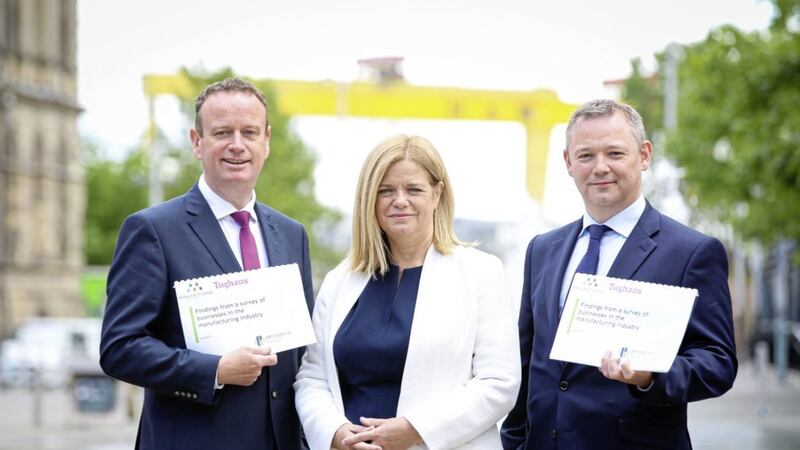TWO out of five manufacturing businesses in the north - that's nearly four times as many as a year ago - are contracting in the face of coronavirus pressures, a survey has said.
And some 1,103 firms in the sector have been unsuccessful in getting any financial help whatsoever from the various government aid schemes - despite £53 million for this very purpose still sitting unspent in the Executive's coffers.
The figures are revealed in the latest Tughans/Manufacturing NI survey, which took in the views of 130 businesses - ranging from the makers of chicken wings to aircraft wings. Field work was done between July 1 and 20.
It paints a picture of a sector which is generally struggling in the face of the pandemic, leaking jobs, limited future confidence, and burdened with the additional challenges of Brexit.
But on the flip side, there was praise for how around 600 firms in the sector, through ingenuity and innovation, were able repurpose their operations and step in to support the front-line effort to tackle the Covid-19 outbreak.
“While on the face of it the picture is bleak, the survey also shows an extraordinary resilience and positive attitude by firms and businesses across the north like Bloc Blinds and O'Neills,” says Manufacturing NI chief executive Stephen Kelly.
The survey shows that more 42 per cent of manufacturing firms are in decline in terms of sales, which compares with 12 per cent of firms reporting downturns at the same time last year.
And while one in three companies are operating at 80 per cent or more, they report that demand is slow. Only a few more companies expect this position to be any better at the end of this year.
Of particular concern are the expectations of companies as they face a future of uncertainty, with four out of five saying they are experiencing sales decreases while half the businesses exporting to Britain are also seeing decline in sales.
And worryingly, the situation could get worse before it gets better, with Mr Kelly suggesting the sector - still buoyed by the furlough scheme - won't see the true outworking of the Covid damage on employment until later in the summer or early autumn.
On the issue of Brexit, 72 per cent of respondents said they weren't confident about understanding and implementing customs arrangements after January 1 next year.
“Covid-19 may be the dominating factor in much of the turbulence being experienced by companies in recent weeks and months, but the spectre of Brexit has again loomed into view, with half our businesses expecting a downturn in the new year,” Mr Kelly added.
“One third of Northern Ireland companies do not believe they have the capacity to deal with the complex new arrangements.
“For the Northern Ireland protocol to work for our businesses, we need to see greater information and details for firms to gear up and funding to help them to prepare for the changes,” he says.
In addition to Covid 19 and Brexit, other areas of prevalent concerns include political uncertainty and the cost of doing business in Northern Ireland.
Two thirds of businesses have reported an increase in labour costs and 64 per cent believe costs and funding challenges are the biggest obstacles to implementing new technologies.
James Donnelly, partner and head of corporate specialist at Tughans, which sponsors the survey, said: “We represent a significant number of manufacturing firms in Northern Ireland and beyond.
“They are facing real challenges at present, and we are seeing an uptake in advice from our specialist teams particularly in relation to HR, contracts and banking.”








